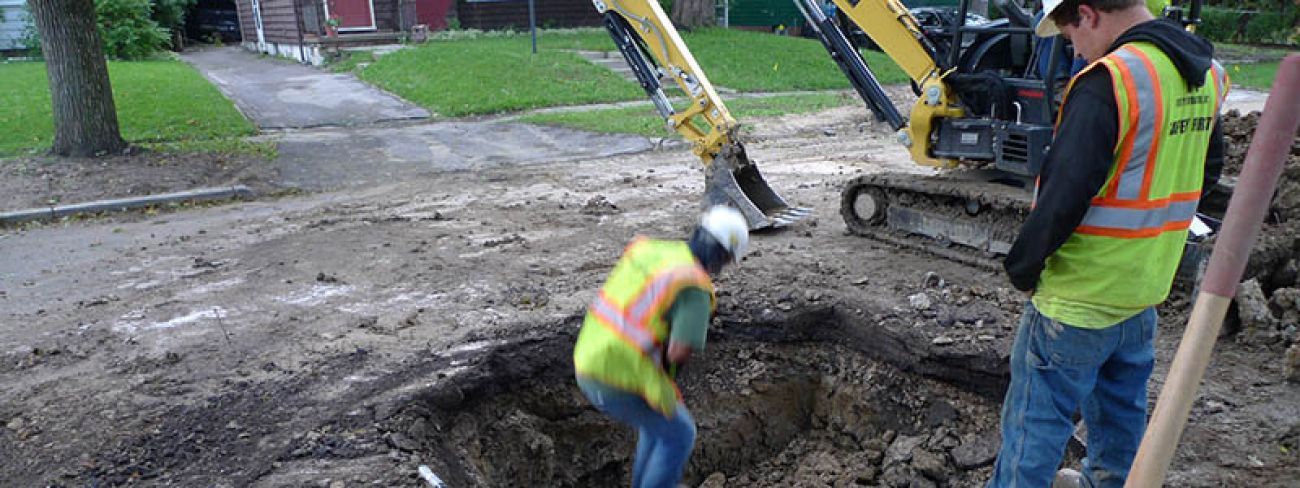Flint misses new deadline in long-overdue lead line replacement effort

- Flint originally agreed to finish replacing the city’s lead service lines by 2020
- After multiple missed deadlines, a judge in February ordered the work completely done by August
- Plaintiffs say the city is already missing deadlines related to that order
Two months after a judge ordered new deadlines for lead line replacement work that was supposed to be done three years ago, plaintiffs in a settlement with the city of Flint say the city has again fallen behind.
As Bridge reported earlier this year, up to thousands of Flint residents are still waiting for service line inspections or dealing with torn-up yards and sidewalks because work crews failed to clean up after past inspections.
As part of a 2017 settlement that Flint reached with city residents and advocacy groups (Concerned Pastors for Social Action, Flint resident Melissa Mays, the Natural Resources Defense Council and the ACLU of Michigan), the city was supposed to excavate some 31,500 service lines at Flint homes, and replace those that might contain lead by January 2020.
Related:
- U.S. Judge: Flint has 5 months to finish long-overdue lead pipe replacement
- Flint residents still fighting to replace lead pipes, get torn yards fixed
- Why Flint’s lead pipe replacement costs so much, and moves so slowly
- Flint finds replacing lead pipes isn’t easy. Even when state promises to pay
But that work has dragged on for years longer than it was supposed to, as Flint struggled against pandemic work stoppages, supply chain issues, trouble with contractors and recordkeeping lapses.
U.S. District Court Judge David M. Lawson in February set a new deadline of May 1 for Flint officials to figure out which properties are still damaged. Lawson gave the city until August 1 to finish the rest of the $97 million lead line replacement effort.
But Addie Rolnick, a Washington, D.C. based lawyer with the Natural Resources Defense Council, one of the plaintiffs, told Bridge that Flint has missed the May 1 deadline as well as a March deadline to conduct outreach to all residents still eligible for service line inspections.
“The city has mismanaged this program for years,” Rolnick said, and the latest setbacks are “deeply concerning.”
“There are residents who have been waiting years for the city to come back and repair their properties, who have really been in limbo,” Rolnick said.
Flint officials acknowledge they missed the deadlines, but city spokesperson Caitie O’Neill said the city is working to catch up and isn’t far behind.
“Our crews have doubled,” O’Neill said, “and they're closing in on it.”
At the time of the February court order, plaintiffs estimated that about 1,000 Flint homes still needed their pipes checked for lead, and thousands more may be dealing with property damage from past excavations.
The lead line replacement effort is a crucial step in the city’s recovery from the Flint water crisis, which began in 2014 after a state-appointed emergency manager approved a disastrous switch of Flint’s water supply from Detroit’s system to the Flint River in a cost-cutting measure, without requiring anti-corrosion treatment.
The change in water chemistry allowed lead to leach from city pipes, prompting a crisis that grabbed national headlines and coincided with a Legionnaires’ disease outbreak that killed at least 12 people.
Although the city has since switched back to Detroit water, health experts advise Flint residents to drink only filtered water until all city lead lines have been replaced.
Rolnick said plaintiffs are “considering all options,” in light of the latest missed deadline.
Michigan Environment Watch
Michigan Environment Watch examines how public policy, industry, and other factors interact with the state’s trove of natural resources.
- See full coverage
- Subscribe
- Share tips and questions with Bridge environment reporter Kelly House
Michigan Environment Watch is made possible by generous financial support from:
Our generous Environment Watch underwriters encourage Bridge Michigan readers to also support civic journalism by becoming Bridge members. Please consider joining today.
See what new members are saying about why they donated to Bridge Michigan:
- “In order for this information to be accurate and unbiased it must be underwritten by its readers, not by special interests.” - Larry S.
- “Not many other media sources report on the topics Bridge does.” - Susan B.
- “Your journalism is outstanding and rare these days.” - Mark S.
If you want to ensure the future of nonpartisan, nonprofit Michigan journalism, please become a member today. You, too, will be asked why you donated and maybe we'll feature your quote next time!






